Photographs: Uttam Ghosh/Rediff.com Rediff Business Desk
The Union Budget 2011-12 is just round the corner. On February 28, even as Finance Minister Pranab Mukherjee announces his Budget proposals there are a lot of challenges that face him.
At a time when scam after scam is taking a toll on the UNPA government and rising prices are crushing the common man under unbearable burden, the task of the finance minister is well cut out.
The new economic policies have caused a total change in the way in which India is growing and acquiring a pride of place at the global high table. To keep the growth momentum going, the finance minister will have to pull out all stops to see that India does not flounder at this critical juncture and that the citizens too are not put to unwelcome hardships.
The responsibilities placed on the finance minister thus have much greater this time around than at any other time in India's history.
There are many challenges that face him and how he handles them in this Budget will determine whether India's fairytale growth story continues to enthral the world or not.
So what the major challenges that the finance minister faces? Click NEXT to find out . . .
The 20 challenges that the finance minister faces!
Photographs: Reuters
1. Rising prices
Fuelled by soaring food prices, rising real estate prices and higher wages, sky-high inflation in India is killing the aam aadmi.
Inflation declined marginally to 8.23 per cent in January from 8.43 per cent in the previous month, as prices of certain commodities like wheat, pulses and sugar eased, although essential items like onion and other vegetables continue to remain dearer.
The headline inflation, based on wholesale prices, has remained above 8 per cent-mark since January 2010. The fall in inflation has been mainly on account of declining prices of sugar (down 14.99 per cent), pulses (12.78 per cent), wheat (4.94 per cent) and potato (1.21 per cent).
However, vegetable and fruits continued to remain expensive. On an annual basis, vegetable prices rose by 65 per cent, and onion prices nearly doubled.
. . .
The 20 challenges that the finance minister faces!
Photographs: Reuters
2. How to deal with corruption
The nexus between politicians, bureaucrats, industrialists and even the media, that caused scams worth $50 billion in just 2010 alone, has shaken the faith of the common man in the system.
These unprecedented levels of corruption could keep foreign investment from coming into the country as global investors look for cleaner markets to park their monies in.
The money that has been lost could have helped create much needed infrastructure and boosted economic activity further.
. . .
The 20 challenges that the finance minister faces!
Photographs: Uttam Ghosh/Rediff.com
3. Income Tax
Finance Minister Pranab Mukherjee is likely to increase the income-tax exemption limit on the personal income side, given that it is a major demand from the populace. The said increase could be inflation-linked.
The exemption limit is Rs 1.6 lakh (Rs 160,000) and considering the fact that inflation is running at around 10 per cent, an increase of 10 per cent in the exemption limit could be expected in the upcoming Budget.
This would mean that the exemption limit would probably be enhanced by Rs 15,000 to 1.75 lakh (Rs 175,000).
This step would result in a revenue loss of around Rs 4,000 crore (Rs 40 billion), and would mean a Rs 1,500 tax benefit a year to the taxpayer.
The increase in the exemption limit would also be a step towards aligning the tax structure with DTC, as the exemption limit under the proposed regime is Rs 2 lakh (Rs 200,000) a year. DTC is expected to come into effect from 2012-2013.
. . .
The 20 challenges that the finance minister faces!
Photographs: Reuters
4. High fiscal deficit
India's gargantuan fiscal deficit is a major cause for concern. Fiscal deficit is essentially the difference between what the government spends and what it earns.
It is expressed as a percentage of the gross domestic product. Higher the fiscal deficit, weaker the economy.
India's fiscal deficit will be at around 5.5 per cent of its GDP in 2010-2011, as a surge in revenue collections has offset high expenditure. Public debt has almost reached four-and-a-half years of revenue.
Therefore, there are reasons to worry.
High fiscal deficit restricts the government's ability to fund development projects, retards growth, does not propel employment-generation and leads to higher interest rates.
Also, government spending on social welfare, education, health, poverty alleviation is severely hampered due to high fiscal deficit.
If a developing country's resources are deployed properly, deficits are not necessarily a bad thing.
But if the revenues keep dropping due to mismanagement and a profligate government lets its expenses get out of hand, disaster is a given.
. . .
The 20 challenges that the finance minister faces!
Photographs: Reuters
5. Crackdown on black money
Post-Independence, India lost a staggering $462 billion, or about Rs 21 lakh crore, in illicit financial flows due to tax evasion, crime and corruption, a research and advocacy group has said in a report.
The report released by Washington-based Global Financial Integrity (GFI) found that the faster rates of economic growth since economic reform started in 1991 led to a deterioration of income distribution which led to more illicit flows from India.
According to the primary findings of the report titled 'The Drivers and Dynamics of Illicit Financial Flows from India: 1948-2008', India lost a total of $213 billion in illicit financial flows (or illegal capital flight).
Based on the last five years of the study, 2004-2008, India lost assets at a rate of $19 billion per year.
So will the government bite the bullet and take the necessary steps to bring back the black money stashed abroad? Let's see what the FM does. . .
. . .
The 20 challenges that the finance minister faces!
Photographs: Reuters
6. Creation of jobs
India's biggest strength is its 'demographic dividend'. India is one of the world's youngest nations. More than 52 per cent of India's 1.1-billion people are under the age of 25, and almost 35 per cent under 18.
This throws up incredible possibilities as its work force is slated to be the world's largest and youngest over the next few years, even as most countries turn grey.
When that much work force puts its shoulder to the wheel, one can barely imagine the earthshaking productivity that it would generate, catapulting the economy into stratosphere.
Provided this work force gets jobs, that is. So, does India have a plan to create jobs for the millions who will soon attain an age where they would need to be gainfully employed? The short answer is 'No'.
There is no apparent long-term plan. There are only short-term attempts to weakly address the issue -- like the National Rural Employment Guarantee Act, which is more a security net than a proper job.
Although it is a laudable effort to provide some succour, it certainly is not enough.
India needs to have flexible labour laws. As firms employing more than 100 people cannot fire workers without government permission, they (the firms) shay away from expanding to over 100 people. This also discourages foreign investment and thus does not help create new jobs.
. . .
The 20 challenges that the finance minister faces!
Photographs: Reuters
7. Boost for the stock markets
Most stock market experts say that they do not expect any major initiatives for the stock markets. They believe that the focus of the markets will be more on effective implementation of investments, fiscal discipline and on sectors which are impacted by the budget proposals.
Investors' stock market wealth has plunged by nearly Rs 700,000 crore (Rs 7 trillion) since the beginning of the New Year.
Total investor wealth, measured in terms of cumulative market value of all listed companies, has plummetted by nearly Rs 700,000 crore.
Foreign institutional investors too are likely to continue selling Indian equities to invest in the more profitable north-east Asian markets till mid-2011, Australian investment bank Macquarie said recently.
Hopefully, the finance minister will do something to revive the markets and restore investor confidence into the markets.
. . .
The 20 challenges that the finance minister faces!
Photographs: Reuters
8. Customs/Excise duties
Subsidies are likely to remain high in the Budget. There could be a possible rollback of the economic stimulus package, which means that the customs and excise duties will rise, thereby leading to an overall increase in prices.
The relevance of the Budget is reducing by the year. However, with nearly five states going to the polls after the Budget, it is likely that the FM may present a populist Budget.
Thus, the impact of the Budget is likely to be neutral to marginally negative.
. . .
The 20 challenges that the finance minister faces!
Photographs: Reuters
9. Stimulus for IT sector
The infotech sector is also looking to the finance minister to provide it with a boost. One of the hardest hit sectors following the global recession was the IT industry and it has since been trying to keep a brave face.
The finance minister faces the challenge of giving the sector a much-needed leg-up so that India's standing as a major global IT hub remains unscathed.
. . .
The 20 challenges that the finance minister faces!
Image: Railway Minister Mamata Banerjee.Photographs: Uttam Ghosh/Rediff.com
10. Safer, cleaner, better Railways
The forthcoming Railway Budget is, perhaps, going to be the toughest one for Railway Minister Mamata Banerjee.
Her detractors are up in arms against her for having allegedly led the Indian Railways towards 'bankruptcy' whereas her loyalists, at least some of them, are sceptical about her 'adventurous' plans.
If the current revenue figures are any yardstick to go by, the railways could just about miss their target for the present fiscal ahead of the Rail Budget which is to be announced on February 25.
The Railways have earned Rs 44,789.55 crore (Rs 447.895 billion) as revenue from commodity-wise freight traffic during April-December 2010 as compared to Rs 42,146.97 crore (Rs 421.469 billion) during the corresponding period last year, registering an increase of 6.27 per cent.
Officials fear that with just two-and-a-half months remaining for the financial year to conclude, the railways would be hard pressed to meet the target.
So will Mamata deliver? Will she provide cleaner, better, safer rail travel? Wait for February 25 to find out.
. . .
The 20 challenges that the finance minister faces!
Photographs: Reuters
11. Poverty alleviation
The economy may be booming at over 8 per cent for the last few years, but India accounts for 50 per cent of the world's hungry. Over 46 per cent of Indian children are undernourished. Health too is a major challenge - the very survival of India's women and children is threatened.
India has been ranked 67, way below neighbouring countries like China and Pakistan, in a new Global Hunger Index by the International Food Policy Research Institute. The number of poor in 2015 is likely to be 279 million at all-India level.
This is a gargantuan challenge before the government and indications of how it proposes handle it could well be had in the forthcoming Budget.
. . .
The 20 challenges that the finance minister faces!
Photographs: Uttam Ghosh/Rediff.com
12. Loans at easy rates
With interest rates rising to curb runaway inflation, life for the common man has become all the more difficult. On the one hand is the spectre of rising prices, on the other is the problem of high interest rates. This problem has put many a necessity out of the common man's hands: a dream home, good education for his child, buying small luxuries like television sets, cars, consumer durables, etc
So will the Budget might hold some goodies for the common man? That's one question that only the finance minister can answer.
. . .
The 20 challenges that the finance minister faces!
Photographs: Reuters
13. Priority for education
India still suffers from a high degree of illiteracy, despite the fact that it has the largest number of English-speaking people in the world.
The country needs a major boost to its primary, secondary and higher education system. More funds need to be allocated to the sector, for it is the best possible investment that a country can make.
So will the finance minister help propel the education sector? That's another challenge that faces him right in the face.
. . .
The 20 challenges that the finance minister faces!
Photographs: Reuters
14. More funds to fight terror
Terrorists have caused havoc in India for long. Every now and then India suffers at the hands of terror that is funded by inimical nations.
India's response has been strong at times and lukewarm on occasion. However, one thing is certain: the common Indian has had enough of such dastardly acts that interfere with his life and happiness.
More funds are required to beef up Indian security and to fight terror. Better weaponry, efficient training, more forces, state-of-the-art surveillance systems, and other intelligence-gathering equipment and task forces all require money. This Budget could see the finance minister allocating extra funds to provide security for the common man.
. . .
The 20 challenges that the finance minister faces!
Photographs: Reuters
15. Bigger share for healthcare
India - where healthcare is still an out-of-pocket expense for the vast majority of citizens - is lagging behind when it comes to healthcare reform.
Should India look at free healthcare or affordable healthcare for all? Should we be controlling the price of drugs or offering direct subsidy?
Is public-private partnership the way forward? The Indian healthcare system currently combines the worst features of the public and private models - the public health system is in a poor state and private care is unregulated and high cost.
The central government is fine-tuning a national health insurance programme for people below the poverty line. However, with access to healthcare a huge challenge, insurance is yet to be considered as a credible means to ensure affordable healthcare to all.
This is also another major challenge facing the finance minister.
. . .
The 20 challenges that the finance minister faces!
Photographs: Reuters
16. Boost for agriculture
Prime Minister Manmohan Singh recently said that the government will focus on modernising the agricultural marketing system and brining in private players to this sector in the 12th Five-Year Plan beginning 2012.
Modernisation of (agricultural) marketing implies greater interaction and involvement of the private sector, he said.
Big agriculture growth will boost the nation's GDP further as almost 70 per cent of India's working population is directly or indirectly associated with this sector.
Pointing out that India has not done as much as it should have to promote modernisation of agricultural marketing, the prime minister said: "We will work with state governments to ease whatever impediments may exist in this regard."
After the green revolution and the white revolution, the Prime Minister said, another major change is required in agricultural marketing to keep in pace with the economic growth and changing dietary habits.
. . .
The 20 challenges that the finance minister faces!
Photographs: Reuters
17. Food security
This is a major challenge that will take up a lot of the government's time. The National Advisory Council recommendation to guarantee foodgrain to two-thirds of the country's population could bloat the government's food subsidy spend by 26 per cent to over Rs 72,000 crore (Rs 720 billion) -- equivalent to over 1 per cent of the gross domestic product.
The foodgrain guarantee is part of the proposed National Food Security Bill.
This is a conservative figure, compared with the Rs 78,000 crore (Rs 780 billion) estimated by Deutsche Bank in a recent research report.
The Centre's food subsidy bill in 2009-10 was estimated at Rs 55,600 crore (Rs 556 billion).
The Rs 72,000-crore estimate is based on the agriculture ministry's calculation of 97 million families in the 'priority' category and 89 million families in the 'general' category.
. . .
The 20 challenges that the finance minister faces!
Photographs: Reuters
18. More funds for infrastructure
India's creaking infrastructure is a big source for worry. Lack of progress on that front acts as a huge barrier to higher growth and shackles the country.
India needs to create world-class infrastructure, including an extensive network of good roads and highways; it needs to propel reforms in the power sector; it needs to create superb public transportation systems in its great cities, and provide adequate power and water to see its industries prosper.
Many Indians still lack basic amenities like electricity, potable water, transportation, healthcare, education, etc. While policy makers seem to be trying to do something about it -- and a lot of it was done during 2010 -- the pace of implementation of policies remains lethargic.
. . .
The 20 challenges that the finance minister faces!
Photographs: Reuters
19. Women's issues
In a pre-Budget consultation meeting, a women's group has asked the finance minister to provide loans at lower interest to the fairer sex.
The women want home loan rates to be lowered specifically for the single women. Also raised was the issue of widows in various parts of the country after their farmer husbands commit suicide. There is data that shows that everyday about 7,000 female foeticides are being carried out in different parts of the country. Also, crime against women is on the rise.
The women's lobby has asked for redressal of these issues, apart from providing equality -- not just on paper -- in jobs, education, and growth.
. . .
The 20 challenges that the finance minister faces!
Photographs: Reuters
20. Reforms push
Signalling that the forthcoming Budget would give a vigorous push to economic reforms, President Pratibha Patil too, in her address to Parliament, said on Monday that the government's top priority would be to check inflation without hurting growth.
On the reforms front, most experts expect a road-map for entry of new private sector banks in the Budget.
Relaxation in FDI limits, if any, in sectors like retail, defence, etc may bring in additional revenues, too.
DTC and GST are expected to be implemented from FY13 and to that extent some enabling measures may be announced.
Also, the government may not tinker much with the subsidy structure.

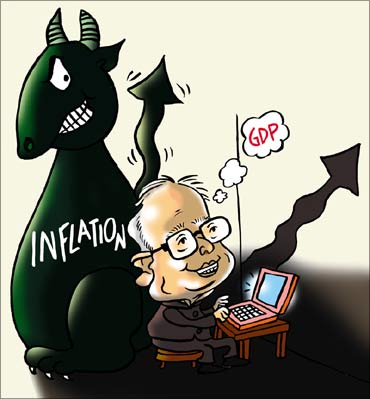


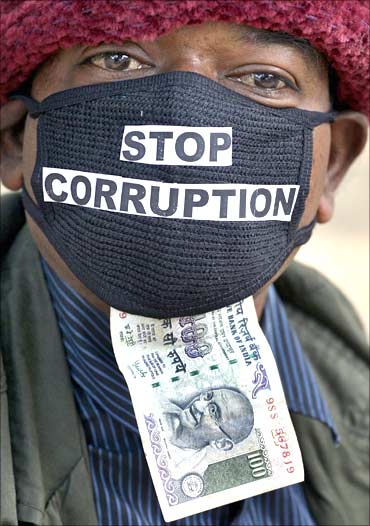
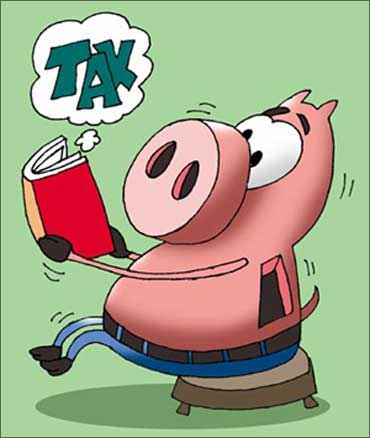

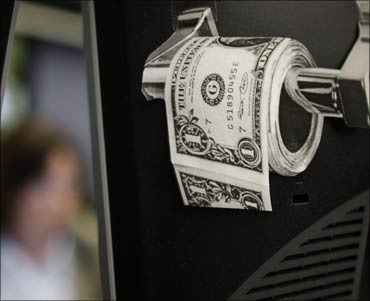
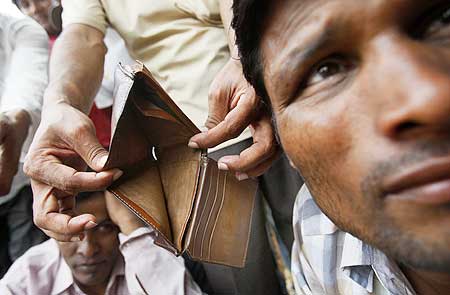


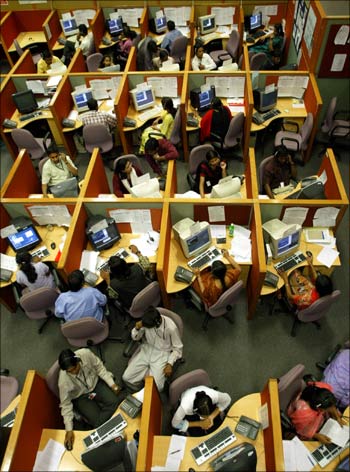
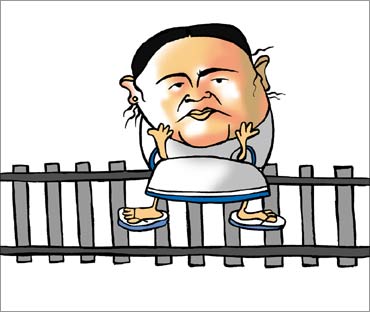
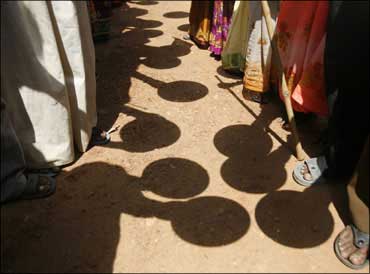
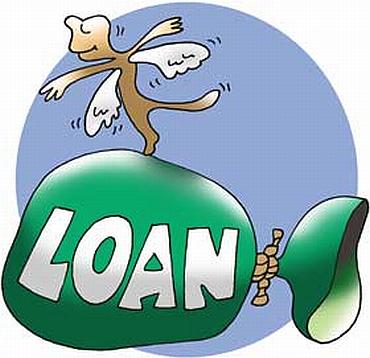
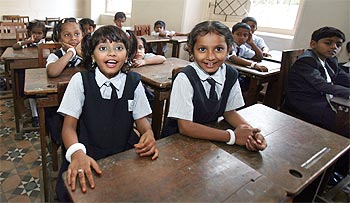

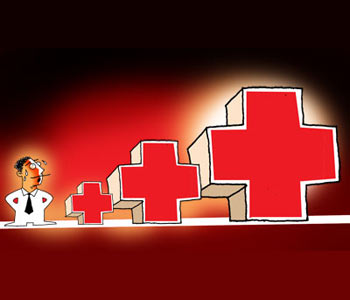
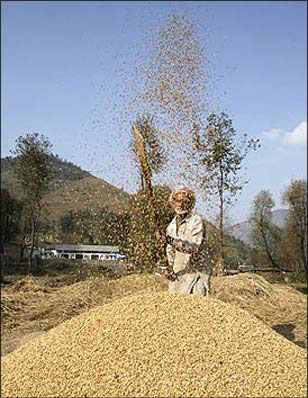
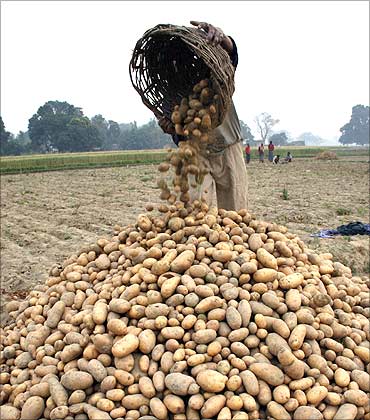
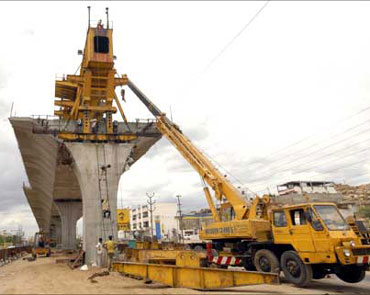

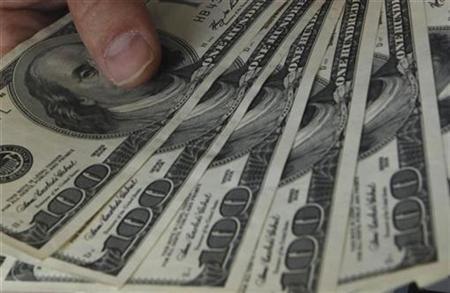
article